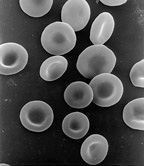
Photo from wikipedia
Objectives: Iron-deficiency anemia (IDA) is a global cause of morbidity in children under five, particularly in sub-Saharan Africa. In southeast Nigeria, poor dietary intake and caregiver knowledge about childhood anemia… Click to show full abstract
Objectives: Iron-deficiency anemia (IDA) is a global cause of morbidity in children under five, particularly in sub-Saharan Africa. In southeast Nigeria, poor dietary intake and caregiver knowledge about childhood anemia are observed; however, there is no consensus on how to best prevent it. This study seeks to test the effectiveness of caregiver education on improving anemia knowledge and dietary prevention strategies and promoting sustainable lifestyle changes to reduce the prevalence of childhood IDA. Study Design: A questionnaire was administered to the primary caregivers of 41 patients under age five with anemia in southeast Nigeria regarding socioeconomic status (SES), diet diversity, and risk factors for anemia. Caregivers were administered a preeducation questionnaire, poster education on anemia and iron-rich foods, and a posteducation questionnaire. All patients underwent a medical exam to confirm a diagnosis of anemia or anemia-related conditions. Results: Ninety-five percent of patients had moderate diet diversity, but there was no correlation between diet diversity and SES. Barriers to healthier diets were associated with SES. Preeducation scores were not associated with caregivers’ education levels; however, posteducation scores were significantly higher in university-educated than technical-trained caregivers. Caregiver-reported self-efficacy increased after the education program. Conclusion: Caregivers’ SES was associated with financial and knowledge barriers to a healthier diet but not diet diversity, suggesting that nutritional education could benefit all SES groups. Overall, the education program increased caregivers’ anemia knowledge across educational levels. A community-based health education program could improve caregivers’ anemia knowledge and self-efficacy in applying this information and potentially reduce this area’s pediatric IDA.
Journal Title: Annals of Global Health
Year Published: 2022
Link to full text (if available)
Share on Social Media: Sign Up to like & get
recommendations!